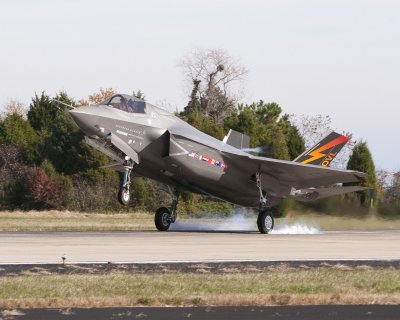
The first F-35B short takeoff/vertical landing variant touches down at Naval Air Station Patuxent River, Md., on Sunday, Nov. 15. The supersonic stealth fighter will immediately begin test flights that will lead to hovers and vertical landings in the coming weeks. (PRNewsFoto/Lockheed Martin Aeronautics Company)
NAVAL AIR STATION PATUXENT RIVER, Md., Nov. 16 /PRNewswire-FirstCall/—The first Lockheed Martin (NYSE:LMT) F-35B Lightning II short takeoff/vertical landing (STOVL) stealth fighter arrived Sunday at Naval Air Station Patuxent River, Md., where it will conduct its first hovers and vertical landings. The ferry flight initiates a sequence of F-35 arrivals at Patuxent River this year and next.
Piloted by Lockheed Martin F-35 Chief Test Pilot Jon Beesley, the F-35B flew from Fort Worth, Texas, to Patuxent River by way of Dobbins Air Force Base in Georgia. Beesley landed on the Patuxent runway Sunday at 12:46 p.m. EST.
"We have high confidence in the capabilities of this aircraft, and we fully expect that it will meet or exceed the expectations of our customers," said Dan Crowley, Lockheed Martin executive vice president and F-35 program general manager. "At Patuxent River, this aircraft will continue the process of validating our revolutionary STOVL propulsion system through a series of short takeoffs, hovers and vertical landings."
The aircraft will be supported at Patuxent River by the F-35 Autonomic Logistics Information System (ALIS) and will be monitored by the Lockheed Martin F-35 Sustainment Operations Center in Fort Worth. Known as BF-1, the aircraft is the first F-35 to be sustained by ALIS - the worldwide support system that will monitor the prognostics and health of F-35s around the globe to ensure mission readiness.
The F-35B will replace U.S. Marine Corps AV-8B STOVL fighters, F/A-18 strike fighters and EA-6B electronic attack aircraft. The United Kingdom's Royal Air Force and Royal Navy and the Italian Air Force and Navy will also employ the F-35B.
The F-35 Lightning II is a 5th generation fighter, combining advanced stealth with fighter speed and agility, fully fused sensor information, network-enabled operations, advanced sustainment, and lower operational and support costs. Lockheed Martin is developing the F-35 with its principal industrial partners, Northrop Grumman and BAE Systems. Two separate, interchangeable F-35 engines are under development: the Pratt & Whitney F135 and the GE Rolls-Royce Fighter Engine Team F136.
Source: Lockheed Martin


